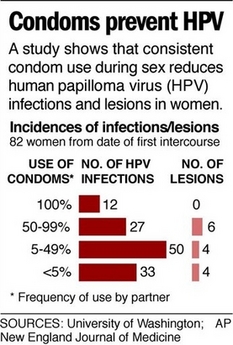For the first time, scientists have proof that condoms offer women impressive
protection against the virus that causes cervical cancer.
A three-year study of female college students - all virgins at the
start - found that women whose partners always wore a condom during sex
were 70 percent less likely to become infected with the human papilloma virus,
or HPV, than those whose partners used protection less than 5 percent of the
time.

"That's pretty awesome. There aren't too many times when you can
have an intervention that would offer so much protection," said Dr. Patricia
Kloser, an infectious-disease specialist at University of Medicine and Dentistry
of New Jersey who was not part of the study.
Condoms have been shown convincingly to prevent pregnancy and AIDS. But
conservatives who want to see abstinence taught in schools have long argued that
condoms do not protect well against diseases such as HPV, because men can spread
the virus to women from sores on their genitals outside the area covered by a
condom.
However, the researchers at the University of Washington found that the
chances of HPV being spread that way appear to be small.
Human papilloma virus - which can cause cervical cancer, genital warts
and vaginal, vulvar, anal and penile cancers - is the most common sexually
transmitted disease, infecting about 80 percent of young women within five years
of becoming sexually active. An estimated 630 million people worldwide are
infected.
The virus is spread during sex from contact with the sores, or lesions, that
develop around infected cells.
Often, the virus is killed by the immune system, but in some people HPV can
take hold and cause lesions that can turn cancerous years later. Cervical cancer
strikes about 10,520 American women and kills about 3,500 each year. Worldwide,
about 500,000 women develop cervical cancer and nearly 300,000 die from it every
year.
In the HPV study, published in Thursday's New England Journal of Medicine,
none of the women who reported that their partners always used condoms developed
lesions during the three-year period. Fourteen women whose partners used condoms
less regularly got lesions.
Twelve of the 42 women who said their partners always used condoms became
infected. Rachel Winer, a researcher in the university's epidemiology
department, said it could be that the couples did not use the condoms correctly
or had some sexual contact before putting on a condom.
Recent medical advances might someday render the condom debate moot: Earlier
this month, the government approved the first vaccine against HPV, and public
health officials are urging that girls be routinely vaccinated before they
become sexually active.